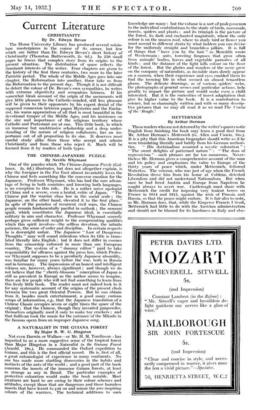One of the puzzles which The Chinese-Japanese Puzzle (Gol- lancz.
2s. (Id.) illustrates, but does not altogether explain, is why the foreigner in the Far East almost invariably loves the Chinese and feels something like the converse emotion for the Japanese. Professor Whytnant, who has had the rare advan- tage of living in both countries and knowing both languages, is no exception to this rule. He is a rather naive apologist of China and a severe, even a brutal, critic of Japan. "The Chinese put the warrior class low in the social scale ; the Japanese, on the other hand, elevated it to the first place." In spite of the paradox of recurrent civil wars, the Chinese people remain fundamentally pacifist in outlook ; the samurai spirit, which constitutes the Japanese ideal, is essentially military in aim and character. Professor Whymant scarcely perhaps gives sufficient weight to the compensating qualities which this spirit involves—the selfless devotion, the infinite patience, the sense of order and discipline. In certain respects he is downright unfair. The Japanese Law of Dangerous Thoughts" may well sound ridiculous when its title is trans- lated literally into English ; but it does not differ in essence from the censorship enforced in more than one European country. The system of a "dummy editor" paid to take responsibility for offences against the press law, which Profes- sor Whymant supposes to be a peculiarly Japanese absurdity, was familiar for many years before the war, both in Russia and in Germany. The impressions of an honest and intelligent witness are, however, always significant ; and though we do not believe that the "cherry-blossom" conception of Japan is still as prevalent in Europe as the author seems to imagine, there are few people who will not find something to learn front this lively little book. The reader must not indeed look to it for any systematic account of the origins of the present clash between the two great Oriental Powers. But he ean obtain from it, besides much entertainment, a good many curious scraps of information, e.g., that the Japanese translation of a Chinese Classic occupies seven or eight times the space of the original ; that the Chinese, though they invented gunpowder, themselves originally used it only to make toy crackers • and that Sullivan took the music for the entrance of the Mikado in the famous opera from an improper Japanese song.




































 Previous page
Previous page